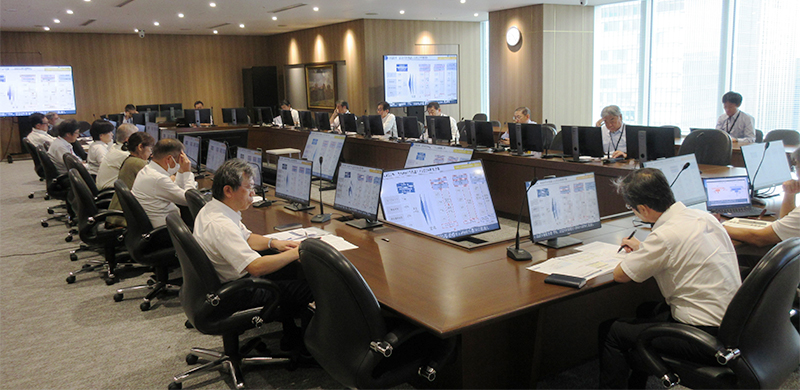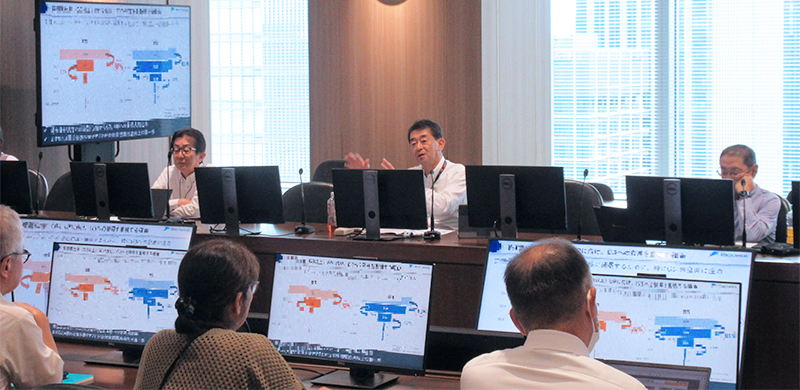The person in charge is the responsible officer for the Corporate Sustainability Committee.
With ESG concerns as a central feature of the Group’s sustainability management, steps are being taking to discuss the Group’s overall direction at various organizations including the Board of Directors and Corporate Sustainability Committee. In addition, the progress of VISION 2030 non-financial metrics and reviewing material topics are also undertaken within this system.
Sustainability Management
Management System
Policy and Basic Approach
Amidst efforts to achieve SDGs and overcome other social challenges, companies are facing increasing expectations and demands for proactive actions and they are expected to play ever more important roles. Under these circumstances, we recognize that the chemical industry is responsible for the foundation of society and innovation, and that it bears a great responsibility to solve social issues. In order to realize a sustainable society, it is essential for companies themselves to grow while continuously creating social value, by providing diverse solutions. To this end, it is now even more important that companies accurately identify opportunities and risks from an ESG perspective and reflect them into management.
The Mitsui Chemicals Group has been promoting a variety of initiatives since it launched its triple bottom line management of economy, environment, and society in 2006. In April 2018, we established the Corporate Sustainability Division, expressing our intention to refine the triple bottom line management approach and commit to corporate management with ESG elements at its core. In 2021, we launched VISION 2030 to further incorporate ESG elements into management and strategies, proceed to the execution phase, and strengthen our efforts to disclose ESG information to stakeholders.
Sustainability in the Mitsui Chemicals Group
Corporate Sustainability Policy
In accordance with SDGs and various other topics under the umbrella of ESG, we will aim to pursue sustainable development of both society and the Mitsui Chemicals Group (in a manner that improves both social value and corporate value) by implementing the following:
- Look for business opportunities, and leverage our business activities to help solve social issues
- Recognize and deal with future risks* lying ahead of the Mitsui Chemicals Group while fulfilling our social responsibility as a company
* Risk:
Uncertainty and change brought about by events surrounding the Group that affect the achievement of management strategies and goals
Aiming for “integration of financial and non-financial performance”
- Non-financial performance is the foundation of financial performance
Respond to “prerequisites for business continuity” and foster trust - Non-financial performance leads to the future of financial performance
Improve “abilities essential to business continuity” and accelerate growth - Non-financial and financial performance mutually affect each other
By “contributing to a sustainable society,” maximize profits
Challenges
Incorporating ESG elements into management and strategy and the implementation thereof
- Reflect ESG considerations in management and policy, strategy and planning discussions at the Board of Directors, Company-wide Strategy Committee, and Corporate Sustainability Committee meetings
- Generate business involving business and R&D divisions and promote innovation
Improvement of ESG information disclosure
- Boost appeal to institutional investors, customers, and sustainability rating agencies
- Strengthen ESG dialogue
System and Responsible Officers
Sustainability Management System
Corporate Sustainability Committee
The roles of the committee are presented as follows.
- Deliberate on the Group’s policies, strategies, plans, and measures as they relate to the promotion of ESG
- Report and discussion of ESG promotion status in the Group
- Discussion of other important matters related to ESG promotion
In principle, the Corporate Sustainability Committee meets four times each year. If circumstances require us to plan new important matters related to promoting sustainability strategies and propose measures accordingly, the committee chair will establish a subcommittee to address such matters. Until FY2021, the committee has been working on addressing climate change and creating plastics strategies by establishing a dedicated subcommittee. However, the scope of activities in the subcommittee has expanded, including carbon neutrality responses, and the need for further deepening and acceleration of the subcommittee's activities has increased. In response, in FY2022, the committee restructured and upgraded the subcommittee into the Circular Economy Center of Excellence (CoE) to further strengthen the initiatives.
Details of the committee’s deliberations and activity results are reported to the Management Committee. In addition, the committee submit particularly important agenda items to the Management Committee and Board of Directors for approval.
Composition of the Corporate Sustainability Committee
| Chair | President |
|---|---|
| Vice Chair | Responsible officer for the Corporate Sustainability Committee |
| Members | Executive officers with specific titles, sector presidents, General Manager of the Green Sustainable Chemicals Division, General Manager of the RC & Quality Assurance Division, General Manager of the Corporate Administration & Legal Division, General Manager of the Human Resources Division, General Manager of the Corporate Planning Division, General Manager of the Finance & Accounting Division, General Manager of the Corporate Communications Division, General Manager of the Corporate Sustainability Division, and other members appointed by the Chairperson |
| Secretariat | Corporate Sustainability Division |
*Corporate auditors also attend committee meetings and are able to offer their opinions whenever necessary.
*The chairperson is able to call on executive officers and general managers at Mitsui Chemicals who have an interest in the matters being deliberated to attend the meetings and ask for their explanation and opinion.
Main Discussion Topics of the Corporate Sustainability Committee (FY2024)
- Material topics / non-financial KPIs review
・ Human capital: Progress in empowerment of women in the workplace (KPI management)
・ Changes in innovation KPIs (KPI review)
・ Recognizing risks (opportunities) that capture social needs/business opportunities
・ Results against non-financial budget targets for FY2024, and setting targets for FY2025
- Expansion of Blue Value™ and Rose Value™ products and services
・ FY2023 performance, framework development status, review results, related investments
・ Response to greenwashing
- Climate change
・ Basic policy and schedule for fuel conversion
・ Circular Economy Center of Excellence (CoE) steering committee
- Common
Promotion system, carbon neutral/circular economy related research and development, digital marketing, carbon neutral strategy rolling, circular economy goals
- Biomass Working Group
Raw material procurement, sales plans/sales expansion strategies, calculation method for Product Carbon Footprint (PCF)
- Recycling Working Group
Raw material procurement, business feasibility studies, domestic trends (mandatory use of recycled materials), revision of guidelines for using recycled materials, calculation method for PCF
- Climate change Working Group
Promotion of Scope 1 + 2 reduction, expansion of Scope 3 calculation
・ GX League/GX-ETS activity status, schedule, and business flow
- Natural capital
・ Policy review, schedule, scoping
- Chemicals management
・ Policy to enhance regulated substances control
- Respect for human rights
・ Progress in efforts to establish a human rights due diligence system
・ Formation of a cross-functional working group
- Information disclosure
・ Trends in non-financial information disclosure, response schedule
・ Non-financial requests from shareholders and investors in FY2023
・ External ESG assessment results: Initiatives required of companies
- Promoting awareness and embedding
・ Internal education and awareness-raising system for promoting sustainability


Corporate Sustainability Committee (August 2024)
Incorporating ESG Elements into the Management System
The Mitsui Chemicals Group aims to build a management system that integrates financial and non-financial aspects by incorporating ESG elements into its management practice and strategies.
Incorporating ESG Elements in Investment and Financing Decisions
The Mitsui Chemicals Group has established a system to incorporate ESG elements and perspectives on social issues, including the SDGs, when making decisions on major investments cases. Starting in FY2019, we decided to include estimates calculated based on ICP*1 in the investment planning form. Furthermore, in FY2022, in addition to IRRs, which were usually evaluated, we added ICP-based IRRs (c-IRR)*2 as a reference for investment evaluation. ICP price, based on a discussion by the Corporate Sustainability Committee.
*1 ICP:
Internal carbon pricing.
*2 c-IRR:
IRR calculated by the following formula: Incremental profit ± GHG increase or decrease × ICP price
Investment Planning Form (Example)

Incorporating ESG Elements in Annual Budgets
Mitsui Chemicals incorporates ESG elements into its basic company-wide budgeting policy.
In FY2020, in our efforts to accelerate the production of Blue Value™ and Rose Value™ products and services, we adopted the sales revenue of Blue Value™ and Rose Value™ products and services as performance indicators in line with the goal under VISION 2030 (40% of sales revenue by product and service). Each business division plans its annual budget based on the challenges and measures for the targets and tracks their progress.
In addition, we have set KPIs and targets that are linked to our material topics as non-financial metrics for VISION 2030. We aim to enhance our corporate value by effectively monitoring the financial and non-financial aspects of our management practice. For KPI, we have designated an officer or a general manager who is responsible for monitoring the progress, and each division manages these KPIs by incorporating them into their annual budgets and targets. In addition, the Corporate Sustainability Committee and the Company-wide Strategy Committee will review progress and related issues from the perspective of how progress toward KPIs each fiscal year will contribute to the achievement of non-financial targets for 2030 (consistency and appropriateness of KPI/target setting) and how efforts to achieve non-financial targets will contribute to the achievement of financial targets (relationship between financial and non-financial targets).

Company-Wide Promotion
ESG Link Café One-Point Lessons
In order to integrate ESG factors into management and strategy, the Mitsui Chemicals Group believes that it is essential for each and every employee to understand ESG and to incorporate it into their work.
To that end, we have been holding ESG Link Café one-point lessons since fiscal 2020—a dialogue-based online event open to all employees, designed to be easily accessible and welcoming to everyone. These lessons deal with and provide quick and simple introductions of a wide variety of ESG-related topics with high social interest, in addition to the Group’s ESG-related initiatives. With time set aside for free discussion after the lesson, the events are also utilized as a place for ESG-themed internal communication.
In addition to these lessons, we also work to instill understanding in the Company in a variety of ways, including a series of posts on the internal site explaining ESG-related terminology, providing educational content, and conducting explanations and dialogue tailored to each division and site. Through a multi-layered approach, we will continue to support each and every employee in incorporating ESG-related initiatives into their own work, thereby facilitating the practice.
Main themes for ESG Link Café
- The Mitsui Chemicals Group's initiatives to promote sustainability strategies
- Certification system and application of Blue Value™ / Rose Value™ Products
- Climate change and carbon neutrality
- Plastics strategies and related initiatives
- Business and human rights
*27 times in FY2020–2024, total 2,647 participants
E-Learning
The Mitsui Chemicals Group has continuously implemented theme-based educational programs on topics such as compliance, information security, Responsible Care, and business and human rights, to deepen understanding of ESG-related topics across the Group. Furthermore, starting in fiscal 2024, we developed and launched an e-learning course titled "Sustainability in the Mitsui Chemicals Group - Policy and Basic Approach (Basic Course)" in both Japanese and English editions, to enhance understanding of our Group corporate sustainability initiatives. This training material is designed to clearly explain ESG-related concepts and terminology using diagrams and illustrations, and is mandatory for all Mitsui Chemicals, Inc. registered employees.
Overview of Each Chapter
- Chapter 1: What is sustainability?
- Chapter 2: Sustainability in the Mitsui Chemicals Group
- Chapter 3: Blue Value™・Rose Value™
Chapter 4: Endeavor to create a circular economy
(1) Climate change policy and Carbon neutral strategy
(2) Biomass strategy and Recycling strategy
- Chapter 5: Respect for human rights in business
- Chapter 6: ESG information disclosure to communicate Mitsui Chemicals Group's initiatives


